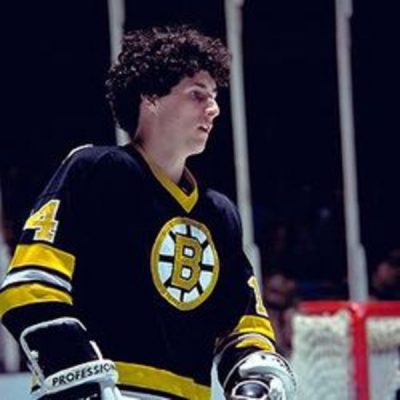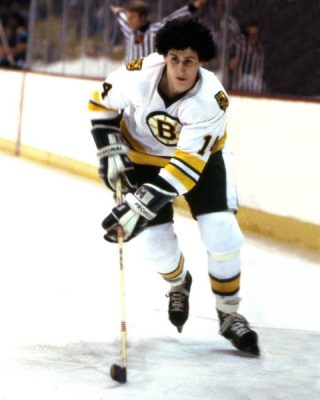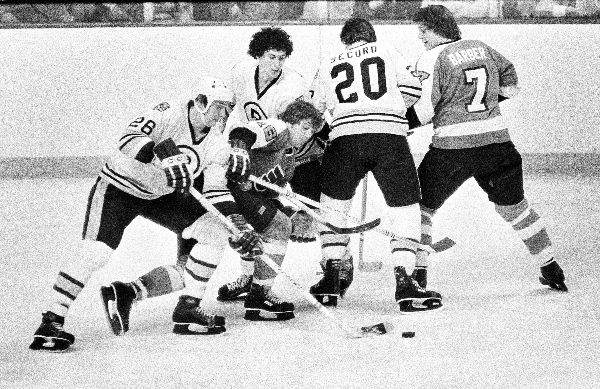
By: Andrew Lindroth | Follow me on Twitter! @andrewlindrothh
Bob Miller was born on September 28th, 1956, in Medford, Massachusetts. Bob showed incredible talent during his high school years and committed to play for the University of New Hampshire as an 18-year-old forward. During his rookie year from 1974-1975, he tore up the ECAC with 21 goals and 59 points in just 27 games, later being awarded ECAC Hockey Rookie of the Year. Bob took a year off from collegiate hockey and joined the United States Hockey team the following year. He was one of the most productive players that season, recording 33 goals and 94 points in 63 contests.
After two consistent years of play, his confidence brought him to the 1976 NHL Amateur Draft, and he was eventually selected 70th overall (fourth-round) by his hometown team, the Boston Bruins. After his dream came true, the Medford native decided to return to college for one more season to continue developing his skills before turning pro.
During his sophomore year, the forward dominated once again, scoring an astounding 30 goals and 89 points in 39 games. After another successful campaign, Bob signed his first professional deal with the Bruins and reported to their American Hockey League minor-pro affiliate, the Rochester Americans, for the 1977-1978 season.

The 21-year-old forward appeared in just three games with Rochester (AHL) before being promoted to the Boston Bruins and immediately filled a hole within their roster. He concluded his freshman year with an impressive 20 goals and 40 points and recorded his first three postseason points during their 13-game rush to the Stanley Cup in 1978. The following season, he went on to have the most productive season of his career, notching 15 goals and 48 points. He also recorded his first postseason goal and an additional helper during the 1979 playoffs.
Bob entered his third year as a Boston Bruin and continued to serve an essential role as a bottom-six producer (and let’s not forget.. he also played with no helmet). In 80 games during the 1979-1980 campaign, the 5’11, 180-pound center recorded a 16-25-41 statline with 53 PIM. He also had his best postseason performance of his career during the 1980 playoffs, with three goals and five points in ten games.
During the 1980 offseason, the Bruins and Bob agreed on terms to renew his player contract, but his journey with Boston would come to an end 30 games into the season. On February 18th, 1981, the Boston Bruins traded Bob Miller to the Colorado Rockies (NHL) in exchange for Mike Gillis. Unfortunately, Bob struggled to fit in the Rockies’ line-up right away, recording six points and a -19 rating in 22 games, and was demoted to the American Hockey League to play for their affiliate, the Springfield Indians for the remainder of the season.

The following season, Bob struggled to stay consistently healthy throughout but managed to appear in 56 games. Unfortunately, his two-way game began to decline and hurt his position in the depth charts going into the next season. At the start of the 1982-1983 campaign, he was assigned to Springfield Indians (AHL) and later found himself without a contract at the end of the year.
He didn’t give up his dream of playing professional hockey and accepted a contract to play for the Karpat Oulu in Finland’s premier hockey league. He went on to have an incredible season, contributing 17 goals and 48 points in 37 games.
Bob’s handwork paid off after his strong performance in Finald as he was offered a one-year deal with the Los Angeles Kings (NHL). The 28-year-old was pieced in between the third and fourth lines throughout the year and recorded what would be his final 20 points in the National Hockey League. Following the 1984-1985 season, Bob found himself as a free agent again and eventually inked a deal with HC Sierre (Swiss). After playing with HC Sierre, he decided to retire from the hockey world in 1986 at 29-years-old.
During his six-year tenure in the NHL, Bob recorded a 75-119-194 statline in 404 career games. Unfortunately, Bob Miller recently passed away on October 1st, 2020.



Happy heavenly birthday Bo! You were my biggest fan, and I was yours.
Bobby is my brother. He was a tremendous athlete. He was a high school standout, College record setter, Olympian, and NHL professional. I miss him every day. He had a unique talent and was the consummate teammate. He had a heavenly birthday on September 28th. I miss my brother immensely.